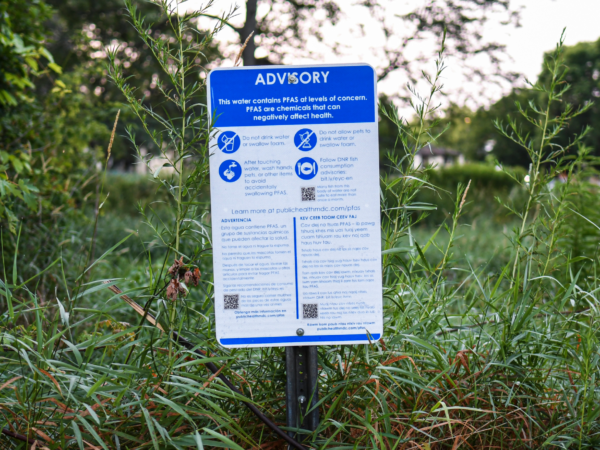
By Lester Graham, Michigan Radio
The Great Lakes News Collaborative includes Bridge Michigan; Circle of Blue; Great Lakes Now at Detroit Public Television; and Michigan Radio, Michigan’s NPR News Leader; who work together to bring audiences news and information about the impact of climate change, pollution, and aging infrastructure on the Great Lakes and drinking water. This independent journalism is supported by the Charles Stewart Mott Foundation. Find all the work HERE.
The State of Michigan is going to stop buying most non-essential products containing PFAS. Governor Gretchen Whitmer is ordering state agencies to avoid buying products containing per- and polyfluoroalkyl substances (PFAS) if possible.
The group of about 4,000 toxic chemicals is used widely in a variety of products and manufacturing. Some rivers and drinking water sources in Michigan have been contaminated by PFAS.
Maine and Vermont have passed laws banning the sale of some products containing PFAS in their states. Michigan lawmakers are unlikely to approve that approach.
“This is Michigan’s first step in doing that in a way that’s significant, something that the Governor can control, which is purchasing power,” said Jennifer Hill, associate director of the National Wildlife Federation Great Lakes Regional Center and one of the leaders of the Great Lakes PFAS Action Network.
Whitmer’s order is not a complete ban. Agencies can still purchase “essential” products even if they contain PFAS.
Even with its limited scope, Hill says the order is important.
“This is a really positive step forward by Governor Whitmer to reduce the amount of PFAS products that we have in our state and ultimately to reduce the amount of PFAS contamination that we have going into Michigan waters,” she said.
The Ecology Center noted the state’s move to avoid purchasing products containing PFAS can help smaller entities such as municipalities, businesses, and others “create more demand in the marketplace for environmentally preferable products.”
The Associated Press reports the Michigan Chemistry Council says PFAS chemicals are not identical and should not be treated the same.
Catch more news on Great Lakes Now:
EPA unveils strategy to regulate toxic ‘forever chemicals’
HBO Audience: John Oliver’s “Last Week Tonight” features the impact of PFAS on Michigan residents
Featured image: Lester Graham/Michigan Radio




